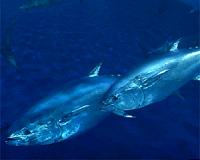 |
Tokyo (AFP) April 21, 2010 The flight chaos brought by Iceland's volcanic eruption has impacted Japan's sushi industry, with seafood traders looking as far as New Zealand to make up a shortfall in imports of Norwegian salmon. Japan usually sources 90 percent of the prized Atlantic salmon from the Scandinavian country, much of it by air cargo, but stocks have run low since flights have been grounded because of the massive volcanic ash cloud. "Absolutely nothing is coming our way. I'm praying that the disruption ends soon," said a trader in Tokyo's Tsukiji fish market, the world's largest. Only three small salmon fillets were in the chilled display case of his tiny store, which usually sells about 20 kilograms (44 pounds) of the fish every day, according to the seller who asked not to be named. The Tsukiji seller said that from Friday he would start receiving shipments from New Zealand of the popular fish, which is served raw as sashimi slices or grilled, while its roe is commonly used as a topping. A major importer, Saihoku Fisheries Corp, which buys 2,000 tonnes of Norwegian salmon a year, said it had lost 30 million yen (324,000 dollars), or roughly a third of its monthly revenue, in a matter of days. The company usually receives boxes of fresh salmon, rather than the more common snap-frozen shipments, via air cargo four times a week, said Mitsunori Ota, who manages the company's overseas operations. The shipments have been stopped by the eruption that started last Wednesday. Norway shut down airspace over the southwestern part of the country early Tuesday after having reopened most of its airspace Monday. Many Japanese businesses have already begun shifting their imports from Norway, traditionally the king of salmon produce, to New Zealand, which usually trails behind exporters such as Canada and Britain. On the supply side, the world's largest fish farmer, Norway's Marine Harvest, has said it has cut salmon harvest volumes since Monday as exports to Asia and North America have fallen sharply since the aviation havoc started. The New Zealand King Salmon Company said customers in Dubai, Bangkok, Singapore, Osaka and Tokyo had all increased their orders "substantially" and that "there's a silver lining to the grey volcanic cloud descending on Europe." "Dubai's order is 100 times the norm while orders from Bangkok are 10 times and the others have all doubled," chief executive Grant Rosewarne said. "Today we have doubled our harvest -- which is an extra 10,000 fish -- and we're putting on an extra shift," he said in a statement Monday. Japan imported 1,400 tonnes of Atlantic salmon from Norway in February, worth more than one billion yen, latest figures showed, compared with 150 tonnes from the rest of the world. At Tokyo sushi shop "Sushi Ichiban (Number One)," manager Kazuo Takayanagi said that the purchase price of raw salmon had surged 20 percent, but thanks to inventories retail prices had not changed from about 220 yen for a small plate. The decision to serve Pacific salmon instead, which Japan imports from New Zealand, Australia and Chile, may prove troublesome for retailers because many clients prefer the Atlantic salmon's delicate texture and mild taste. "Of course if this disruption continues, we will have to begin importing from New Zealand, but Norway salmon has always been famous and that's the taste that customers are used to," he said.
Share This Article With Planet Earth
Related Links Farming Today - Suppliers and Technology
 Tuna sushi in US busts recommended levels for mercury: study
Tuna sushi in US busts recommended levels for mercury: studyParis (AFP) April 21, 2010 Tuna sushi bought at a range of US restaurants and supermarkets had mercury that breached levels set by health watchdogs, a study published on Wednesday said. The offending samples included bluefin tuna, the hugely-prized species that has been plunged into a fierce conservation battle, the researchers reported in the British journal Biology Letters. One hundred sushi samples were collect ... read more |
|
| The content herein, unless otherwise known to be public domain, are Copyright 1995-2010 - SpaceDaily. AFP and UPI Wire Stories are copyright Agence France-Presse and United Press International. ESA Portal Reports are copyright European Space Agency. All NASA sourced material is public domain. Additional copyrights may apply in whole or part to other bona fide parties. Advertising does not imply endorsement,agreement or approval of any opinions, statements or information provided by SpaceDaily on any Web page published or hosted by SpaceDaily. Privacy Statement |